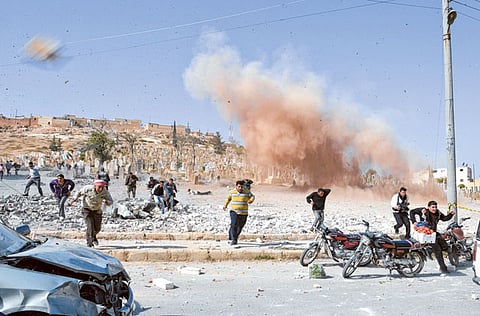Brahimi wants UN resolution based on Geneva deal
Russian minister dismisses need for resolution, highlighting divisions over crisis in Syria

Cairo: The international mediator on Syria, Lakhdar Brahimi, called on Sunday for world powers to issue a UN Security Council resolution based on a deal they reached in June to set up a transitional government in a bid to end the bloodshed.
Russian Foreign Minister Sergei Lavrov, speaking at the same Cairo news conference, dismissed the need for a resolution and said others were stoking violence by backing rebels, comments that highlighted divisions and the impasse over the crisis.
The uprising began with peaceful protests in March 2011 but turned into an armed revolt after Syrian President Bashar Al Assad turned his military on the demonstrators. About 32,000 people have been killed.
The Geneva Declaration, that was agreed in June 30 when Kofi Annan was still international mediator, called for a transitional administration but did not specify what role, if any, Russia’s ally Al Assad would have.
“It is important that the Geneva Declaration be turned into a resolution from the Security Council to gain the power to enable it to become an applicable political project,” Brahimi said after a meeting between him, Lavrov and Arab League chief Nabeel Al Araby in the Egyptian capital.
“I encourage member states at the Security Council to continue talks to reach this resolution,” said Brahimi, appointed by the United Nations and League, who earlier pressed for a ceasefire during the Eid Al Adha holiday last month that failed.
Lavrov said both sides should be forced to sit down to negotiations, saying Moscow backed the Geneva Declaration.
“Unfortunately, some countries which participated in Geneva don’t speak with the government but only with the opposition and encourage them to fight till victory and this has very negative implications,” he said.
“Maybe we don’t need a resolution” from the Security Council, he said, adding that a resolution could lead to more instability by creating conditions to remove the Syrian government. “This is a successful recipe to continue the bloodshed,” he said.
Al Araby noted that disagreement between the five veto-wielding powers on the Security Council prevented reaching any binding agreement.
Russia and China, both permanent council members, have vetoed three Western-backed UN draft resolutions condemning Al Assad’s government for the violence. The other three permanent members are the United States, Britain and France.
China said on Thursday it had proposed a new initiative to head off an escalation of violence in Syria, including a phased, region-by-region ceasefire and the establishment of a transitional governing body.
“There is no military solution to the crisis,” Brahimi said, adding that without a political process to end the violence “the crisis won’t stay inside Syria but will flow to neighbouring countries and possibly distant countries”.



